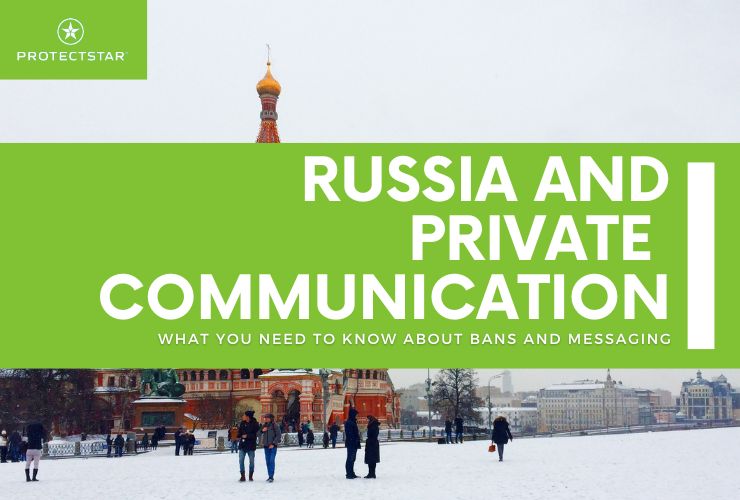Massive Blocking Campaign in Russia: What You Need to Know for Private Communication

In the past few weeks, Russia has launched a massive campaign to block encrypted messaging services, cutting off access to some of the most popular platforms for secure communication. Here's a recap of how things unfolded:
- Early August: Signal, one of the most trusted encrypted messaging apps, stopped working. Even with its built-in circumvention mode, users found it difficult to bypass restrictions.
- Within days: Session, another secure messenger, was blocked.
- Last week: Threema, a privacy-focused messaging app, went down and hasn't been able to connect since.
- Today: Matrix and SimpleX, both known for decentralized and secure communication, have also been taken offline in Russia.
As a result, for those in Russia or planning to go there, the options for private and secure communication are shrinking fast. Currently, there are only two viable ways to stay connected:
- Signal via a private proxy
- Using a VPN to access the above-mentioned messengers
However, it's not as simple as it sounds. Russia’s Internet Service Providers (ISPs) have also implemented heavy restrictions on VPN protocols like OpenVPN and WireGuard, making it harder for users to bypass these blocks. Let’s dive deeper into why Signal needs to be used with a private proxy and why VPNs are facing challenges in Russia.
Why Signal Requires a Private Proxy
Signal is renowned for its end-to-end encryption and privacy features, making it a top choice for users who value confidentiality in their communications. However, the recent crackdown has affected even Signal’s integrated circumvention mode, rendering it ineffective against Russia’s aggressive network filtering.
To bypass these blocks, the only reliable method is through private proxies. Here's why:
- Public proxies are easier for ISPs to detect and block.
- Private proxies provide a more discreet way to connect, as their IP addresses aren't publicly listed or shared, making them harder to trace or restrict.
- When connected through a private proxy, Signal users can bypass the government filters and continue using the app to send encrypted messages.
However, Signal on its own, without a proxy, is unlikely to function in Russia due to the extensive filtering mechanisms now in place. Private proxies essentially act as a hidden bridge between you and Signal’s servers, allowing for secure communication without drawing attention from ISPs.
Why OpenVPN and WireGuard Are Banned
VPNs have long been a go-to method for bypassing censorship and accessing restricted content, but in recent months, Russian ISPs have moved to block the most common VPN protocols, namely OpenVPN and WireGuard. Here’s why these protocols have been targeted:
- OpenVPN: This protocol uses standard ports and encryption, making it easy to detect through deep packet inspection (DPI), a technique used by Russian ISPs to analyze traffic patterns. Since it’s widely recognized, OpenVPN connections are often blocked or throttled by ISPs.
- WireGuard: Though more modern and lightweight compared to OpenVPN, WireGuard’s usage patterns are still recognizable to DPI systems. WireGuard’s efficient protocol structure makes it fast, but its predictability in traffic patterns also makes it easier to filter.
Some ISPs have even gone as far as banning Shadowsocks, a popular tool for circumventing censorship that disguises VPN traffic as regular HTTPS traffic. With these restrictions, using traditional VPNs has become increasingly difficult in Russia.
To overcome these challenges, users are turning to more advanced protocols like Vless/Vmess, which are less recognizable to ISP filtering systems and offer a better chance of bypassing restrictions.
Enhance Your Privacy with Protectstar’s Firewall AI
As the digital landscape in Russia tightens, privacy and security have never been more critical. Whether you’re using Signal via private proxy or a VPN with advanced protocols, you still need an extra layer of protection, especially on your Android device. That’s where Firewall AI by Protectstar comes into play.
Why Firewall AI is Essential for Android Users
Protectstar’s Firewall AI offers unparalleled protection for your Android device, keeping your data secure and preventing unauthorized access. Here’s how:
- Protection and Control: The firewall is ready to use in seconds and provides instant protection against hacker attacks, phishing attempts, and unwanted data leaks.
- Real-Time Monitoring: With Firewall AI, you can see in real-time which apps are trying to connect to the internet, giving you full control over your data usage. This feature is essential in today’s environment, where malicious apps or spyware can secretly send data to third parties.
- Customizable Rules: You can set up simple filter rules to allow or deny specific app connections. This gives you full control over which apps can access the internet, providing an extra layer of security against any potential breaches or unauthorized data transfers.
By combining Firewall AI with advanced circumvention methods like private proxies and secure VPNs, you can protect your online privacy, even in restrictive environments like Russia.
For those looking for the safest way to browse and communicate on Android, there's no better tool than Protectstar’s Firewall AI. Protect yourself from hacker attacks, monitor your apps, and stay secure—no matter where you are.
👉 Get Firewall AI now and safeguard your Android experience: Protectstar Firewall AI